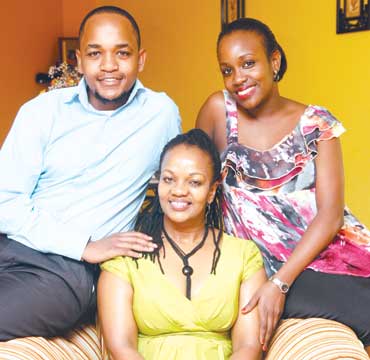By Shirley Genga
 |
|
Roseline adressing a grief group. |
Grief is a powerful emotion no one can prevent from happening. It is not a respecter of persons, and it can affect anyone at any place and any given time.
Roseline Ouma is only 37, but has come face to face with grief many times in her life. She has been through a failed marriage, infertility and the death of a fiancé. These are what prompted her to begin the Rona Foundation in her living room to help people deal with grief.
“People often misunderstand the word grief. They believe it is a preserve of the bereaved, yet it is something people experience whenever they face any form of loss. Whether it is loss of a job, inability to have children, end of a marriage or even failure of a business — it is still a loss.
“Grief remains generally unaddressed here in Kenya. Everyone likes to imagine that grief is something that can be swept under the rag and everything will be okay, but it is one of the hardest things to overcome especially if you do not have the right support,” explains Rose.
She says people who are grieving have no place to go find refuge. Everything is left to the church to handle, which unfortunatley does not have the capacity to do so.
Mentor
Rose grew up in Wagoma, Bondo in a polygamous home.
“My father had three wives, and my mother had seven children. I moved to Nairobi in 1998 to attended college,” says Rose.
She stayed in Kibera in a house her eldest sister, who lived nearby, had rented for her and other family members. Rose’s eldest sister was a great influence in her life. She was focused, hardworking and was able to rise out of poverty, enabling her to move from Kibera to Lang’ata and finally to Kileleshwa.
“Although my eldest sister prospered financially, I watched her struggle as she struggled to conceive children. She had been married for 15 years and had done everything she could to conceive, but nothing worked. She went through depression and was hospitalised severally. In the end, her kidney failed and she passed on in 1996,” remembers Rose.
Her late sister was the driving force of their family and was the glue that held the family together and after she died everyone was lost.
“In that same year I got pregnant, but later found out it was an ectopic pregnancy. I ended up losing my pregnancy at three months and one of my fallopian tube was removed,” she continues.
Afterwards her father started to suspect that she had the same problem as her older sister. And he told her “Never let a man or anyone mistreat you because you cannot have children”, words that she carries with her till today.
Stay informed. Subscribe to our newsletter
Rose’s father later passed on in 1997 and in the same year got her first job as a press assistant at the Government Press, while still studying at Kenya Polytechnic.
Failed marriage
In 2000 at the age of 26 Rose got into a relationship with a man 20 years her senior and looking back, she believes it was one of the big mistakes of her life.
“I was naïve, I knew he was married and when he asked me to be his second wife I accepted. I grew up in a polygamous home so I believed it could work. My family, especially my mother was against it, but I did not listen,” says Rose
She got into the marriage not knowing what was expected of her nor him.
“I first moved into the house he shared with his first wife and children, I lived in the spare bedroom. His first wife was good to me and we tried to make it work, but after a while I realised we could not continue living in the same house and so I got my own place,” remembers Rose.
While she was coming to terms with the marriage she was also dealing with a number of health issues such as ovarian cysts as she also tried to get pregnant.
“I got the best fertility doctors, but the more I tried to get pregnant the more it became apparent that I was not going to conceive a baby. Life got in the way and we drifted apart. We began to fight a lot,” says Rose.
She now understands that there is a price that comes with being the second wife.
“He would be gone most of the time and I spent a lot of my days alone,” she remembers.
“I became depressed, a shell of the girl I was before. I had caused a rift in my family by marrying a married man. He was also obsessive that at the end I lost all my friends. I reached a point where all I did was sleep, I lost a lot of weight and was in and out of hospital. In my third year of marriage I finally reached the point where I knew that I had to leave if I did not want to die inside,” she says.
Rose admits it was one of the hardest decisions she ever had to make because apart from the fact that society generally looks down on women who are divorced, she left her marriage with nothing, but sheer determination to survive.
“My marriage was over and often women we hold on to died marriages and end up dying inside. My husband was a good provider and I could have stayed because of financial security, but I knew my story was not over. I was alone and starting all over again was not easy and of course people talked ill things about me, but I was determined to succeed,” asserts Rose.
New start
So she began a business, Onset Designer, to supplement her income from Government Printers where she earned peanuts. That was in in 2003. Rose did not start with much, but with patience and hard work she now has hired eight tailors and receives bulk orders from corporates.
As she was rebuilding her life she met an old acquaintance, Oscar Obala.
“He had been my friend before, but we had never dated, this time though he convinced me to give him a chance and so we began to date,” she says
And for the first time Rose says she felt like she had met her prince charming.
“I had found my better half. We did everything together from business to owning property. Some people spoke badly about me because of my failed marriage, but he stood by me. Things were refreshingly beautiful for the first time,” she continues.
When he was part of the ODM secretariat.
“Two days before the peace pact was signed between President Mwai Kibaki and Prime Minister Raila Odinga, in 2008 he fell sick. That night I had a dream that a bird came and tore out my heart and in that moment I knew he had died,” she remembers.
Oscar was buried in March 2008. The sad irony was — he fell sick and died a week after they were officially engaged.
“To find love and then to lose it is something I would not wish on my worst enemy,” she says in tears.
After the funeral Rose says she returned to her house in Lang’ata to one of the darkest periods of her life.
“I had survived a failed marriage, the death of my father and three siblings, and infertility, but I did not know how to survive Oscar’s death. It was too much for me. I could not eat, I could not bathe and even leaving my bed was a problem. I would not have survived had my close friends not stood by me,” she says.
And in those dark moments she says Rona Foundation was birthed — a grief and loss programme.
“I would invite people to my home where we would share, talk and heal. It has slowly grown to the point where we have an office on Ngong Road, and we now go out and help to incubate grief groups all over Kenya. We were recently in Mavoko and Mombasa,” she explains.
The programme has three pillars; recovery, re-entering society and economic empowerment.
“Grief can take a life time to heal and there are moments when I breakdown, but when I see how far I have come I hold on to the hope that it was all for something. I thus wipe my tears and match on. I run Rona Foundation from my own pockets and those of well-wishers and I hope to spread my wings across the country,” she finishes.
 The Standard Group Plc is a
multi-media organization with investments in media platforms spanning newspaper
print operations, television, radio broadcasting, digital and online services. The
Standard Group is recognized as a leading multi-media house in Kenya with a key
influence in matters of national and international interest.
The Standard Group Plc is a
multi-media organization with investments in media platforms spanning newspaper
print operations, television, radio broadcasting, digital and online services. The
Standard Group is recognized as a leading multi-media house in Kenya with a key
influence in matters of national and international interest.
 The Standard Group Plc is a
multi-media organization with investments in media platforms spanning newspaper
print operations, television, radio broadcasting, digital and online services. The
Standard Group is recognized as a leading multi-media house in Kenya with a key
influence in matters of national and international interest.
The Standard Group Plc is a
multi-media organization with investments in media platforms spanning newspaper
print operations, television, radio broadcasting, digital and online services. The
Standard Group is recognized as a leading multi-media house in Kenya with a key
influence in matters of national and international interest.







